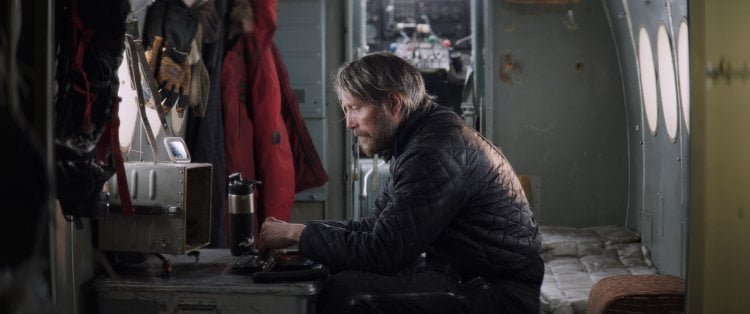Arctic

After a rescue attempt to his plane crash site fails, Overgård (Mads Mikkelsen) must decide whether to stay in the relative safety of his makeshift camp with dwindling supplies or make an arduous trek with his would be injured rescuer (Maria Thelma Smáradóttir) out into the frigid “Arctic.”
Laura's Review: B+
Cowriter (with Ryan Morrison)/director Joe Penna makes his feature debut with a gripping survival thriller that is all the more satisfying for not spelling everything out for us. Essentially a one man show (Smáradóttir’s character is barely conscious), Danish actor Mads Mikkelsen shoulders this grueling production with few words but all kinds of shading, conveying thoughts with minimal facial expression. We have no idea who Overgård is or what he was doing in the Arctic, but we can begin to piece together something of a background (Penna foregoes flashbacks or voice over of interior thoughts). We first see him digging a trench, putting aside rocks he comes across. An overhead shot reveals that he has dug out an SOS. The rocks are piled in a pyramid, suggesting a burial cairn. Overgård has set up a fishing hole, his gutted catch neatly lined up in a snow filled cooler. A huge paw print signals danger and, after having immediately taken shelter, Overgård emerges later to spy the polar bear in the distance. He also has a signal transmitter which he hand cranks, but when the device’s light changes to green, suggesting a response, it arrives just as a threatening storm. The helicopter he so exuberantly greets is buffeted around, struggles, then falls into the horizon. Overgård stands in stoic shock for several moments then springs into action. He finds the female pilot unconscious, a gash on her forehead, a more serious wound in her gut. After finding the copter’s medical kit and stapling, then covering, her wound, he strips the downed aircraft of supplies and drags the pilot back to his plane where he places a photograph he’s found of her with her husband and child above her head. A routine is established but when his medicine runs out and the rescue he was so sure would follow her fails to appear, Overgård plots a route out on a topographical map. It might seem less than riveting watching a man dragging a makeshift gurney through the snow, but Penna and Morrison (who also edited) have found all manner of pulse pounding moments without ever making their tale overly dramatic. That bear is still out there. That map isn’t perfect. The pilot’s wound looks infected and frostbite is setting in to Overgård’s extremities. The sudden appearance of Arctic purple flowers signals one thing and delivers quite another. Above all, we have Mikkelsen who forms a relationship with his barely conscious costar that recognizes what she has to live for while making us wonder what he has lost. Shot on location in Iceland by cinematographer Tómas Örn Tómasson, the film’s landscape is mostly white and black with pops of red courtesy of the plane’s tail and Overgård’s parka. Morrison makes some interesting editing choices, minimal time shifts within a scene giving insight into Overgård’s method. Original music by Joseph Trapanese subtly adds gravitas. Grade:
Robin's Review: B+
From the opening moments of “Arctic,” we are presented a fait accompli: a man (Mads Mikkelsen) is digging and working in a frozen waste land. Finished for the day, he heads back to his shelter – a crashed plane. The work he performed? A gigantic “SOS” scraped from the snow. That says it all in “Arctic.” Everyone who has seen “All Is Lost (2013)” will compare it to “Arctic,” and it is a valid comparison. The former, starring Robert Redford as a man on a solitary journey, is a story of a man’s choice that chance changed to disaster. The latter is about a choice that chance, not the man, thrust upon him. Both films are about a man in the wilderness and his will to survive. The man goes through his daily routine – checking his ice fishing lines, cleaning his catch, going to higher ground to transmit his emergency beacon, and then back to his “home” – with the movements of an automaton, out of need rather than hope. Life simply and with great hardship, goes on. Then, while transmitting his distress beacon, he gets a reply. Rescue is imminent when an approaching storm strikes and the helicopter of hope crashes. That is just the first few minutes of “Arctic.” I will leave the rest for you to see for yourself. It is a tale of survival against all odds and Mads Mikkelsen embodies the determination of the man to try and try to his last breathe. His performance is near-silent and he conveys his feelings and emotions with expression and body language. The man’s ordeals are gut-wrenching to watch in what I call a knot-in-the-pit-of-the-stomach viewing experience, and I mean that in a good way.

